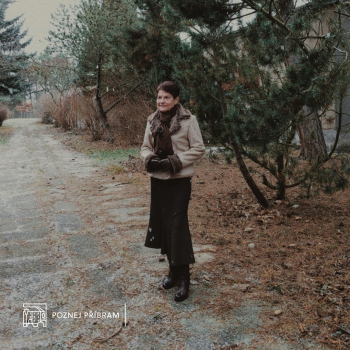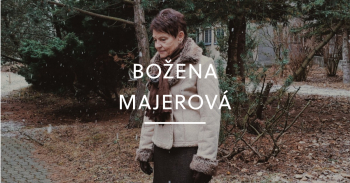Božena Majerová
Years ago she was the director here, now she comes here herself for English classes.
"Today we learned how to use the verb have," she greets us enthusiastically and begins to tell us why languages have always been important to her. Božena Majerová has been in education for almost fifty years - and this is the story that brought her to it.

|
I always liked working with children. I worked in children's organizations, went as a leader to children's camps, was an assistant trainer in the Sokol. Initially, I wanted to be a children's doctor, also inspired by the then head of the children's ward at the hospital in Pribram. However, in the end I listened to my father, who reminded me that despite my excellent grades, I would not get into medicine, because our family had an imaginary black mark. My parents refused to join the party. And the idea of becoming a scientist was out of the question. So I decided to go to the Faculty of Education in České Budějovice, majoring in Russian language and history. Being a teacher was not my dream job, but I always enjoyed working with children. I graduated from the faculty in 1968 and unfortunately, August 21 came. It was perhaps the worst day of my life so far. In the morning my brother came in from the night shift and woke us all up by shouting, "You are sleeping here and the Russians have occupied us!" It was a shock for all of us. I remember my mother saying, "Hurry up, get up. We have to buy some groceries!" So I was sent out to buy supplies. There were people everywhere and everyone wanted food, food, food. |

|
The soldiers settled in the area of today's stadium on Litavka. We went there to see it, of course. There were shouts like "Ivan, go home" and so on. My husband-to-be at that time, together with a neighbour, went to Prague that day to photograph the horror. I was worried about them, but fortunately they were unharmed. In the meantime, we were pasting posters around town with quotes from our poets to protest the occupation. Even today, I get goosebumps when I think of these memories. In September I started teaching at the primary school in Březové Hory. Teaching the Russian language after the occupation, against which there was such an aversion, seemed at first completely impossible. I liked Russian culture, mostly architecture, but I must admit that the Soviet films that were being made at the time were absolutely unwatchable. |

|
Whether I was a teacher, a deputy or later a principal, the contact with children and adults was fulfilling. John Fitzgerald Kennedy said that "freedom without education is dangerous, education without freedom is useless." And I have always supported education, and still do, especially in this day and age when there are so many options and opportunities. I think especially important nowadays is knowledge of languages, where we have always lagged behind. I myself am now learning English in my old age, coincidentally where I taught for many years. I am of the opinion that everyone should try everything. And I highly recommend that you do too. ■ text: Karel Kraus and Zdeněk Kubát, photo: Karolina Ketmanová |
Other articles:












